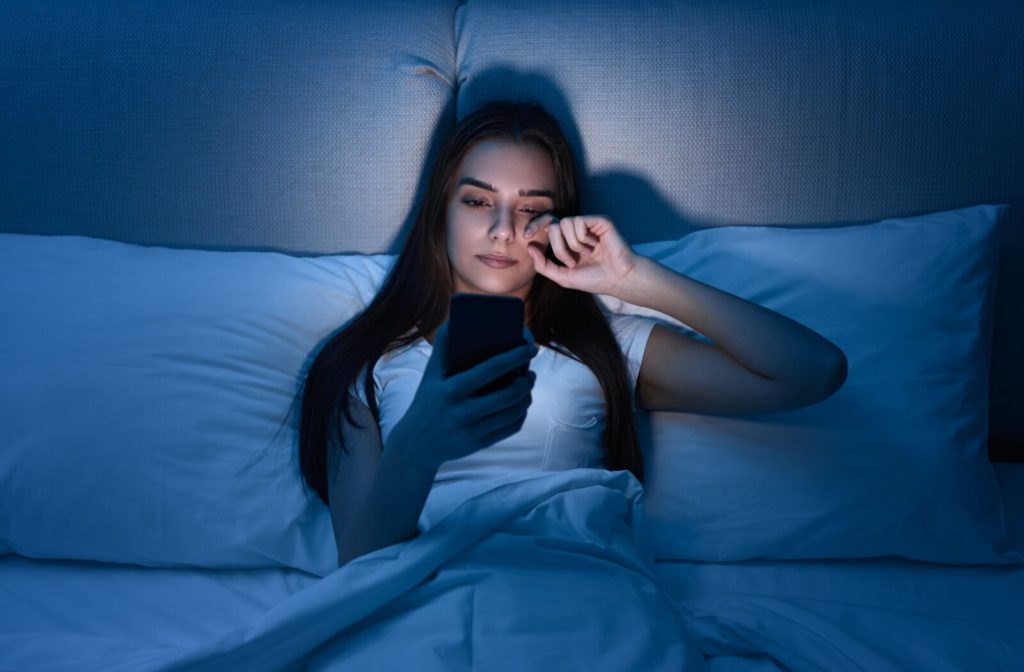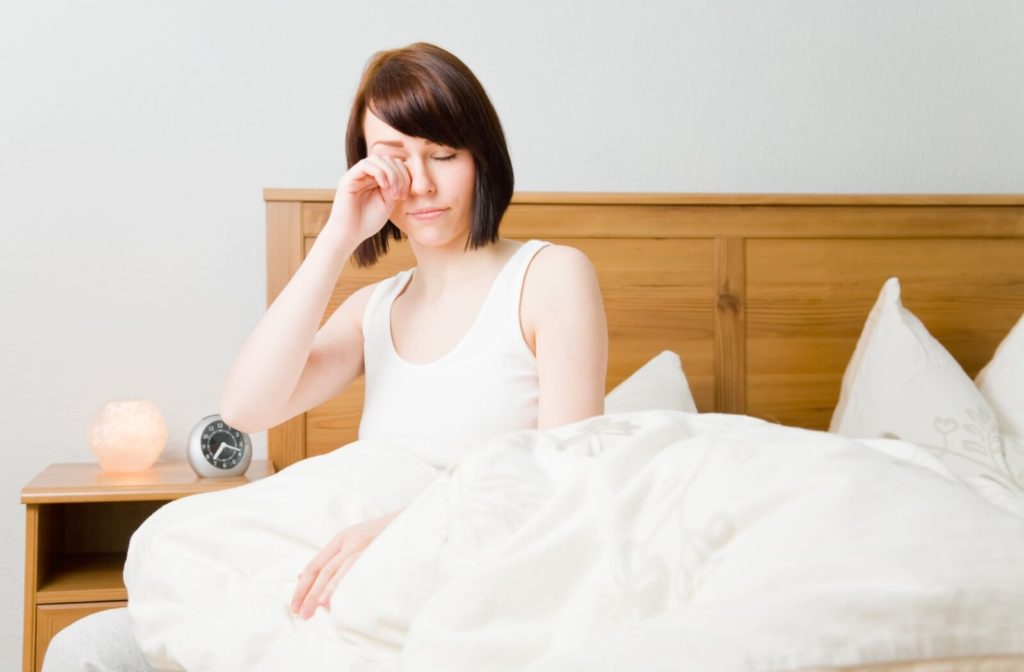Waking up with dry eyes can be a particularly uncomfortable experience that affects many people on a daily basis. This common issue can be attributed to a variety of factors, such as:
- The quality of the sleep environment, including the presence of air conditioning or heating which can reduce humidity levels
- Screen time before bed, which can lead to decreased blinking and increased dryness in the eyes
- Hydration levels, as insufficient water intake can contribute to dryness
- Underlying medical conditions like Sjogren’s syndrome or blepharitis which directly affect eye moisture.
If you find yourself waking up with dry eyes often, it may be helpful to make some changes to your sleeping routine or visiting your eye doctor for treatments.
How Sleep Environment Affects Eye Moisture
Your sleep environment plays a significant role in the moisture levels of your eyes. Here are key environmental factors to consider:
- Humidity Levels – Low humidity can exacerbate dry eyes. Using a humidifier in your bedroom can help maintain adequate moisture levels.
- Air Quality – Ensure your sleeping area is free from smoke, strong chemicals, and pollutants that can irritate your eyes.
- Bedding and Pillows – Opt for hypoallergenic pillows and bedding to minimize exposure to allergens.
Medical Conditions Linked to Morning Dry Eyes
Certain medical conditions are known to contribute to the development of dry eyes, impacting the quality and stability of your tears. These conditions include:
Blepharitis
Blepharitis involves the inflammation of the eyelids, which can block the oil glands located at the edge of your eyelids.
When these glands are blocked, the quality of your tears is reduced because the oil layer of the tear film is essential for preventing evaporation.
Meibomian Gland Dysfunction (MGD)
MGD is a common condition where the oil glands in the eyelids, known as Meibomian glands, don’t function properly. This dysfunction can lead to a deficiency in the oily layer of the tears, causing tears to evaporate more quickly than normal.
This rapid evaporation can lead to the eyes drying out more quickly, contributing to the discomfort and symptoms associated with dry eye syndrome.
Sjogren’s Syndrome
Sjogren’s Syndrome is an autoimmune disorder characterized by its significant impact on the body’s ability to produce tears and saliva. This condition leads to dry eyes and mouth, affecting overall comfort and health.
Lifestyle Factors Contributing to Dry Eyes
Several lifestyle choices can impact eye moisture:
- Diet – Consuming a diet low in omega-3 fatty acids can affect tear production.
- Smoking – Tobacco smoke is a known irritant that can worsen dry eyes.
- Contact Lens Use – Wearing contact lenses, especially overnight, can cause dryness.
Impact of Screen Time on Eye Health

Prolonged screen time is a significant contributor to dry eyes, particularly for office workers who spend hours in front of computers.
The reduced blink rate during screen use can lead to faster evaporation of tears, causing dryness and discomfort.
How Hydration Levels Influence Eye Moisture
Staying hydrated is essential for overall health, including eye health. Dehydration can reduce tear production, leading to dry eyes.
Make sure to drink plenty of water throughout the day to maintain adequate hydration levels.
Tips for Preventing Dry Eyes While Sleeping
Here are some practical tips to help prevent dry eyes while you sleep:
- Use a Humidifier – Maintain a comfortable moisture level in your bedroom.
- Stay Hydrated – Drink enough water during the day to keep your body hydrated.
- Choose Hypoallergenic Bedding – Reduce exposure to allergens that can irritate your eyes.
- Consider Eye Masks – Using a moisture-sealing eye mask can help keep your eyes lubricated overnight.
Effective Treatments for Morning Dry Eyes
If you frequently wake up with dry eyes, consider these treatments:
- Artificial Tears – Over-the-counter artificial tears can provide immediate relief.
- Warm Compresses – Applying a warm compress to your eyes can help stimulate oil production and improve tear quality.
- Prescription Medications – Consult with an eye care professional for prescription treatments if over-the-counter options are ineffective.
When to Seek Help for Dry Eyes
If home remedies don’t alleviate your symptoms, seeking professional help is your next step. Untreated chronic dry eyes may lead to more severe complications. Optometrists like at The Eye Care Team can offer treatments like:
- Punctal plugs, which block tear ducts to retain moisture
- LipiFlow, a procedure that clears blocked glands in the eyelids
Both options can significantly improve dry eye conditions by addressing their underlying causes.
Maintaining Eye Health
Maintaining healthy eyes involves a combination of good habits and regular check-ups. Here are some final tips to ensure your eyes stay happy and healthy:
- Regular Eye Exams – Schedule annual eye exams to monitor your eye health and catch any potential issues early.
- Limit Screen Time – Take regular breaks from screens to reduce eye strain and dryness.
- Balanced Diet – Incorporate foods rich in omega-3 fatty acids to support tear production.
Understanding the causes of dry eyes and taking proactive steps can help you wake up feeling comfortable and ready to tackle the day.For personalized advice and treatment options for dry eye, book an appointment with The Eye Care Team.



